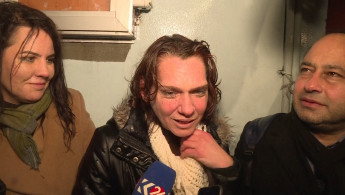Prize-winning Turkish writer released on 'terrorism charges' without trial
A prize-winning Turkish novelist has spoken out about conditions in behind bars following four and a half months in jail, shortly after she was freed on Thursday.
Asli Erdogan, 49, remains on charge for "making propaganda for the PKK" - a Kurdish pro-independence militant group - for her work at the pro-Kurdish newspaper, Ozgur Gundem.
"They take you and throw you into a hole. It's very hard, it's like I'm still inside," she said.
Although an Istanbul court ordered Erdogan's release from Bakirkoy prison, her legal status is still unclear and she still potentially faces life in prison on terrorism charges.
Erdogan said she felt she was in shock and she was trying to get medical attention for a condition she had developed on the back of her neck.
Speaking with journalists following her release, Erdogan became emotional as she vowed to continue her work, regardless of pressure from the authorities.
"There is less and less difference between the outside and the inside," she said, referring to the increasingly authoritarian atmosphere in Turkish society.
 |
"There is less and less difference between the outside and the inside," she said. |  |
"There is no guarantee that you will get home tonight and not be back here tomorrow."
Erdogan was arrested on 16 August - along with twenty other employees at Ozgur Gundem - after the newspaper was closed by executive order. Erdogan was a columnist at the paper and also served on the newspaper's advisory board.
"They are being prosecuted for writings and thoughts that are in no way reprehensible according to Turkish law," said Baris Yarkadas, an MP in the opposition Republican People's Party.
A number of themes in Erdogan's works include human rights violations in prison, violence against women and Kurdish rights.Around 100,000 people have either been arrested or fired in what has occasionally been referred to as Turkey's modern-day "purges", as the authorities target any apparent example of dissidence.





 Follow the Middle East's top stories in English at The New Arab on Google News
Follow the Middle East's top stories in English at The New Arab on Google News
![The UAE is widely suspected of arming the RSF militia [Getty]](/sites/default/files/styles/image_330x185/public/2024-11/GettyImages-472529908.jpg?h=69f2b9d0&itok=Yauw3YTG)
![Netanyahu furiously denounced the ICC [Getty]](/sites/default/files/styles/image_330x185/public/2024-11/GettyImages-2169352575.jpg?h=199d8c1f&itok=-vRiruf5)
![Both Hamas and the Palestinian Authority welcomed the ICC arrest warrants [Getty]](/sites/default/files/styles/image_330x185/public/2024-11/GettyImages-2178351173.jpg?h=199d8c1f&itok=TV858iVg)